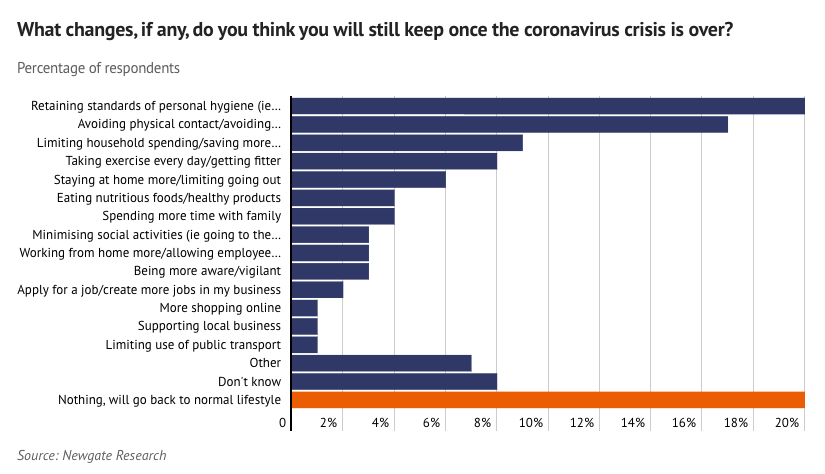Blogbook
An Unusually Serious Message from Old Spice — this ad highlights the disparity in impact that the coronavirus has had on African-Americans.
The Tiger King is a documentary for the lockdown era — full of drama, in the bizarre underworld of big cat pet breeding, complete with ethically dubious storytelling. Via The Atlantic:
At this particular moment, the most-watched show in America is a seven-part documentary series about a gay, polygamous zoo owner in Oklahoma who breeds tigers, commissions and stars in his own country-music videos, presides over what he describes as “my little cult” of drifters and much younger men, and ran for governor of Oklahoma in 2018 on a libertarian platform. He’s also currently serving a 22-year prison sentence for, among other charges, trying to arrange the assassination of his nemesis, an animal-sanctuary owner in Florida. And his business allies include another big-cat breeder—a yoga-loving guru in Myrtle Beach who runs what appears to be a tiger-themed sex sect.
The Last Dance is an American sports documentary that focuses on the 1997-1998 season of the Chicago Bulls, with footage from an all-access pass. Via TechRadar:
Chasing a second ‘three-peat’ – winning an NBA championship in three consecutive seasons – The Last Dance follows who some consider the greatest ball player of all time, Michael Jordan, and the Chicago Bulls in their 1997/98 season. Supplemented with some never-before-seen footage and illustrious talking heads including all-star ex-pros, Bill Clinton, Barack Obama, and MJ today, this ten-part drama is the result of exclusive access enjoyed by NBA Entertainment cameras. You may not need to know the first thing about basketball to watch it, but you may not develop enough affection for the team to stick with it.
Juara by Zakat Singapore is their latest ad for Ramadan 2020: an evocative, beautifully shot emotional ad about the difference zakat makes. For those unaware of what Zakat is:
Zakat is the third pillar of Islam. It requires Muslims to give 2.5% of their qualifying wealth each year to help Muslims who need it across a range of categories. Zakat is both a spiritual duty and a vital part of the Islamic social welfare system.
Zakat is more than just a payment or a random act of charity. It’s a unique form of religious social welfare which benefits the whole community.
This Onigiri ep by Eater is about how Yumiki Ukon, a famous onigiri master in Tokyo whose creative recipes have made her shop a huge success.
It’s been a scary few months, but Australians stepped up to the challenge. Whether it’s been working from home, keeping kids at home, or doing necessary delivery, healthcare, and other work, things in Australia so far look under control so far, enough that elective surgeries are opening up and restrictions are beginning to relax. Projections for the post-pandemic economy predict a global recession: millions of people around the world have already lost their jobs, stock markets are see-sawing up and down, property prices are crashing, large companies like Neiman Marcus and Virgin Airlines have declared bankruptcy, and oil has dropped below $0. The effects of the pandemic are likely to be felt by Australians and Australian companies for a while. With some luck and forward planning, it’s possible to mitigate the fallout – and that’s where we come in. Here are some strategy tips to help your business get back on its feet.
Post-Pandemic Trends
- Watch that supply chain: As manufacturing shut down in China, the effect was felt across the globe. Businesses that were over-reliant on one part of the world for manufacturing were left in the cold. If you can make it locally, make it local. When the panic buying first hit Australia, products that were largely manufactured locally (such as toilet paper) were able to ramp up production and recover consumer confidence quickly. If you can afford to start up your own delivery service instead of being beholden to platforms that might consider you not essential enough or might become overburdened from general demand overnight, do so.
- Go digital: Social distancing has led to a boom in online and contactless transactions. This isn’t new – the outbreak of SARS in China caused its online retail platforms Alibaba and JD.com to become far more popular than they were. The current pandemic is likely to have the same effect, but globally. The behavioural changes brought about from the pandemic are likely here to stay for a while: if you haven’t been considering an omnichannel approach to your stores, it’s about time. Via Inside Retail:
This new-world customer is now more comfortable with online transactions, fewer real-life interactions, and trained to constantly sanitise in public spaces. This, of course, may fade out, but some of these behaviours, habits and trends will stick. The physical store will be forced to change; it will need to be a strong enabler for online shopping, allowing for a much more seamless back and forth, with savvy mobile shoppers expecting faster, more convenient and smarter transactions. In China and Japan, stores are already set up as highly tech-enabled, allowing the customer to shop in-store but at the power of their mobile device. Product information could be discovered by a quick scan of a QR code; customers could roam the store purchasing products as they scanned, paying for it in the moment via WeChat.
- Reduce your physical footprint: As much as having a brick and mortar store will add to your brand’s credibility, it’s likely that retail will shift slowly towards smaller footprints or to a mixed retail and services outlook. Now that people are getting more and more used to getting things online overall, you’d need to either have an extra offering in-store, or just a smaller physical store. Small retailers – now’s also your chance. The playing field is starting to level down.
- Preserve customer and staff safety: Stores that were quick to put into practice measures that protected customer and staff built trust in their brand, while stores that put through half measures (or measures that didn’t work well at all, reportedly), began to generate bad press. In an increasingly information-rich world where people are willing to shop according to their values, showing a willingness to risk your own staff in the name of profit will be something people are likely to remember and avoid. On the other hand, brands that were responsive to their customers’ and staff concerns quickly shored up customer relationships, building lasting goodwill.
- Evolve ad strategies: Ad spend dropped off a cliff during the pandemic, or were quickly pivoted to COVID-19 related messaging. Brands with more digitally native platforms and campaigns were quicker and more nimble, which came off as being more responsive to their customers.
- Keep lower customer spending in mind: In a time of record unemployment, Australia looks set on entering a serious recession despite government stimulus. One in ten Australians have said that they intend to spend less after the shutdown, and will likely change their habits:

Brands will have to adjust to this new spending environment, by looking closely at what they’re offering and how they’re offering it.
Want to know more? Like to have a chat? Give us a call.
Akashinga: The Brave Ones is a new National Geographic show following the all-women anti-poaching initiative in Zimbabwe of the same name. Via National Geographic:
Scenes like this are the essence of the Akashinga’s mission and familiar scenarios for its founder, Damien Mander, a tattoo-covered Australian and former special forces soldier who has trained game rangers in Zimbabwe for more than a decade. His experiences serving in Iraq and on the front lines of Africa’s poaching war have taught him that change—be it peace among humans or attitudes about wildlife—can’t happen without buy-in from the community. “Local people have a vested interest in where they come from, where they live,” he says. “Foreigners don’t.”
film: https://www.youtube.com/watch?v=oX_WcRTj180
There’s a new Kylo Ren Star Wars short for Star Wars Kids… it contains a surprising amount of animated violence, considering.
Burrell’s powerful latest PSA is part of its #BlackIsHuman campaign, calling attention to the death of Jason Hargrove from the coronavirus. Via the Burrell site:
Our initiative, called “Black is Human,” first began by calling attention to the violence affecting young black boys, that was tragically their “normal,” while growing up every day. Our efforts were to inspire change, by showing black boys as humans, not statistics, and with the same hopes and aspirations any boy would have “if” they lived long enough to even achieve adulthood.
Now, we are facing yet another human tragedy. The loss of lives due to the COVID-19 pandemic is devastating, and the black community is disproportionately impacted with blacks being twice as likely to die from the virus.
Jason Hargrove was simply doing his job as a bus driver in Detroit. He died April 1, 2020 from COVID-19, eleven days after he shared his message about civic responsibility. Despite stay-at-home orders, people are out in public spaces without masks and gloves endangering essential workers, and the family of Jason Hargrove said, “he did not deserve this.”
“Please, people, I’m begging you. I’m begging you. Do not let my husband’s death be in vain,” is Jason Hargrove’s widow, Desha’s heartbreaking plea.
Idris Elba narrated Don’t Quit, a poem on behalf of the BBC, over a montage of the BBC’s Covid-19 news, asking people to stay united together. Via the Drum:
Discussing the launch of the campaign, Kerris Bright, chief customer officer, BBC said: “At a time when people are apart we wanted to focus on the things which actually, are bringing us together. We hope this BBC film does that, and reinforces the things which connect us in these difficult times.”
Adding to this, Helen Rhodes, executive creative director, BBC Creative said: “This is a time when everyone is pulling together to get through this crisis. We really hope we’ve managed to capture the emotion of that and show the ways in which the BBC is trying to help by using all our resources to keep us connected and bring us closer”.
